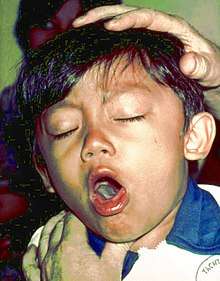kāss
See also: kass
Latvian

Kāss
Etymology
From an older (still dialectally attested) word kāsus, from Proto-Baltic *kās-, from Proto-Indo-European *kʷās- “cough, to cough.” Cognates include Lithuanian kosulỹs, Proto-Slavic *kaš(ь)lь (Russian кашель (kášelʹ), Bulgarian кашлица (kášlica), Czech kašel, Polish kaszel), Old High German huosto, German Husten, Sanskrit कासते (kāsate).[1]
Pronunciation
- IPA(key): [kāːs]
Noun
kāss m (1st declension)
- cough, coughing (a sudden noisy burst of air from one's mouth, often a disease symptom)
- tas bija liels un nepārtraukts kāss ― that was a big, uninterrupted cough(ing)
- lāgiem viņai uznāca kāss, tad viņa ilgi kāsēja bez balss, gandrīz nosmakdama ― sometimes she had a cough, then she coughed without voice for a while, almost stifling
- sauss, rejošs kāss mainās ar sēcošas aizdusas brīžiem ― a dry, barking (= deep) cough sometimes alternates with wheezing shortness of breath
Declension
Declension of kāss (1st declension)
| singular (vienskaitlis) | plural (daudzskaitlis) | |
|---|---|---|
| nominative (nominatīvs) | kāss | — |
| accusative (akuzatīvs) | kāsu | — |
| genitive (ģenitīvs) | kāsa | — |
| dative (datīvs) | kāsam | — |
| instrumental (instrumentālis) | kāsu | — |
| locative (lokatīvs) | kāsā | — |
| vocative (vokatīvs) | kāss | — |
Synonyms
Related terms
References
- Karulis, Konstantīns (1992), “kāss”, in Latviešu Etimoloģijas Vārdnīca (in Latvian), Rīga: AVOTS, →ISBN
This article is issued from
Wiktionary.
The text is licensed under Creative
Commons - Attribution - Sharealike.
Additional terms may apply for the media files.